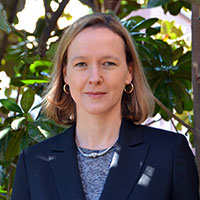UNC researchers to address arsenic-induced diabetes with $12.2M grant
March 16, 2020
Researchers at the University of North Carolina at Chapel Hill will band together across disciplines to find and formulate solutions for arsenic-induced diabetes in the state. The 5-year program is funded through a highly competitive award from the National Institute of Environmental Health Sciences, which totals $12.2 million.

Dr. Rebecca Fry
Rebecca Fry, PhD, the Carol Remmer Angle Distinguished Professor in Children’s environmental Health at the UNC Gillings School of Global Public Health, will serve as principal investigator of the UNC Superfund Research Program.
Millions of individuals in the United States are exposed to potentially high levels of inorganic arsenic (iAs), which poses serious public health challenges. In North Carolina, inorganic arsenic contamination can result from industrial activities, such as coal production, as well as from naturally-occurring sources.
An estimated ~3 million individuals — representing one-third of the population in North Carolina — drink water from private wells, with iAs concentrations in some regions ranging up to 800 parts per billion. These populations are largely located in rural areas of the state, prompting environmental justice concerns. The link between inorganic arsenic exposure and diabetes is well-established. There is, however, a significant gap in the knowledge of factors that drive iAs-induced diabetes risk.
“I am excited to lead this talented team to identify the mechanisms that drive iAs-induced diabetes,” Fry said. “Our goal is to develop new solutions, interventions and treatments to reduce the prevalence of diabetes and other iAs-associated diseases.”
The Superfund Program team includes researchers from the UNC Institute for Environmental Health Solutions (which Fry directs); the UNC Gillings School’s Departments of Environmental Sciences and Engineering (Orlando Coronell, PhD, and Kun Lu, PhD), Nutrition (Mirek Styblo, PhD) and Biostatistics (Fei Zou, PhD); the UNC School of Medicine’s Department of Genetics (Fernando Pardo-Manuel de Villena, PhD); the UNC Institute for the Environment (Kathleen Gray, PhD) and RENCI — the Renaissance Computing Institute at UNC (Stan Ahalt, PhD). Owen Duckworth, PhD, from N.C. State University and Praveen Sethupathy, PhD, from Cornell University are also leading research efforts.
“The UNC Superfund Research Program brings to the national Superfund portfolio a focus on solving problems by first understanding causes, then devising methods to reduce exposure and to translate that to improve population health,” said Barbara K. Rimer, DrPH, dean and Alumni Distinguished Professor at the Gillings School. “The populations affected adversely by inorganic arsenic have much to gain from the outcomes of this research and the researchers’ commitment to translation for public benefit.”
Contact the Gillings School of Global Public Health communications team at sphcomm@unc.edu.
